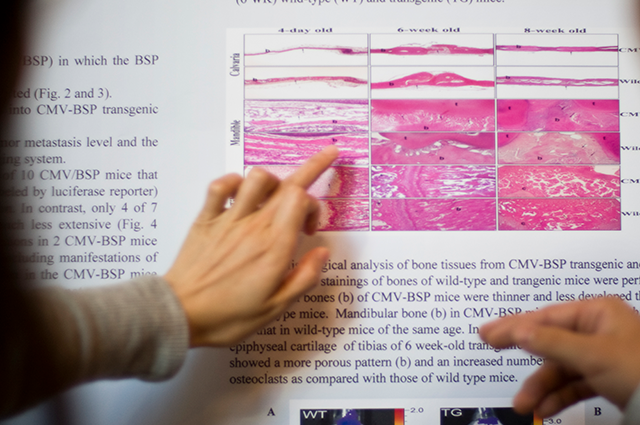PDD Students Find Community in Research

Students in the GSBS MS Program in Pharmacology and Drug Development (PDD) spend two years working in the lab, completing coursework, and writing a thesis. Graduates go on to work as researchers in the biotech or pharma industries, or further pursue their research by completing a PhD. Some graduates even plan to do both.
Ash Kulkarni, a PDD graduate whose research in Dr. Jamie Maguire’s lab focused on the effects of binge drinking on postpartum depression, is currently pursuing a PhD in biomedical sciences with a focus on pharmacology at the University of Florida. After graduation, she’s thinking about going into industry.
“After my PhD, I’m looking into consulting, venture capital, and other options,” she said. Some current students are following in Kulkarni’s footsteps, thinking about both academia and industry.
“Pursuing a Ph.D. or working in the biotech or pharma space as a research scientist: both of those options are exciting to me,” said Keyede Oye, a second-year PDD student who studies the role of MPP1/p55 on intracellular cholesterol trafficking and how this impacts development in Dr. Athar Chishti’s lab. “To have scientific independence and indulge my creativity, I might need to do a Ph.D. and have applied to some programs. If that doesn’t work out, however, I can work in industry,” she said.
For Zixuan Hao, another second-year PDD student whose work in Dr. Alexei Degterev’s lab focuses on cell death, the program has clarified her future career plans. “This program is really similar to a PhD program, but much shorter,” she said. “We have seminars and journal clubs, we train in the lab and do experiments, and we write a thesis.”
“I really enjoyed my experience here, especially working in the lab,” Hao continued. “That’s why I decided to apply to PhD programs.”
Oye also found lab research to be a vital component of the PDD program.
“I applied to the PDD program because I want to work in drug discovery, and you can’t do that unless you understand disease at the molecular level,” she said. “Being able to ask the right scientific questions and have the resources and tools to answer those questions, is what’s interesting to me.”
The opportunity to work in different labs during the rotation process was one of the reasons Kulkarni, who got her bachelor’s degree from the University of Mumbai, chose to come to Tufts.
“A lot of schools don’t offer rotations, but in PDD we do,” she said. “The rotations were very important to me as I figured out what type of research I wanted to do; getting my feet wet in that lab for a few weeks was a great opportunity.”
In addition to lab rotations, Kulkarni had several other reasons for choosing the PDD program.
“The coursework was very focused on pharmacology, which was exactly what I wanted, and having such a wide variety of research happening among the department faculty was also very important,” she said. “And then I spoke to Dr. Pothos on the phone, and he was super nice. Everyone I talked to was so supportive and just wanted us to do well, and I thought, even just while chatting on the phone, that this must be such a great community.”
Her first impression turned out to be correct. “The faculty were super nice; my mentor especially was so helpful, she really wanted me to succeed.”
Kulkarni’s assessment was shared by other PDD students. “The first thing that really got me excited about the program was the opportunity to interact with people from different backgrounds,” said Oye, who is from Nigeria. “In my class I have people from different places, and it’s wonderful to learn things from your classmates that you didn’t know about their countries.”
“My favorite part of the program is the people,” said Hao. “I’m from China, this is my first time in America. I feel welcome, and I’ve made lots of friends.”
Kulkarni agreed. “I made so many cool friends,” she said, “and I’m still in contact with them. It was just such a good atmosphere to study in.”